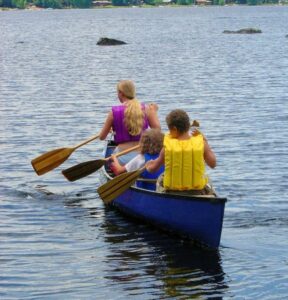By Maeve Thompson
Camps are about learning as much as they’re about fun. Through hands-on experiences, unique challenges, and cooperative tasks with newly-made friends, those stories about camp will resonate for a lifetime. So picking the right camp is critical. Knowing a few very important questions ahead of time and following these tips for choosing the right camp will ensure you match a child’s interests to the right camp.
Is your child ready?
This may seem like a simple question, but it is a key one. Before investigating camps, make sure your child is ready to attend. Transitions are usually easy with school aged children in day camps, but overnight camps require more maturity and independence that differ with a child’s development. Children who do well at sleepovers or have been on family weekend camping trips are more likely to transition easier when away from home. You might also ask if a camp offers a one or two night trial sleepover before committing to a longer-term overnight camp. However, if you’re a helicopter parent who’s the one that’s nervous about an overnight stay, either accept the fact that camp is about the child and not you, or don’t look into overnight camps in the first place.
What are your child’s interests?
Involve your child.
General camps offer a variety of activities that range from outdoor sports to craft activities. However, if your child dreams he’s a Rembrandt, yearns to win the Olympic canoe racing event, or finds telescopes and outer space his mission in life, there are plenty of specialty camps that match a specific focus with the child’s interests. Special needs camps are also a primary consideration. After plugging into your child’s interests, you can decide if day or residential camps are right for your child.
Get started early, and do your research.
Some camps fill up quickly, so don’t wait until school’s almost out to decide camp is a good idea. Some camps even start accepting registrations a year ahead. Once you’ve answered some basic questions with your child about what kind of camp you’re looking for, talk to the camp advisors and schedule a conversation with the camp director. Have a list of questions that you consider critical factors to help you ask the right questions. Once you’ve narrowed down the field of camps, ask them to send you an information package. Also, be sure and visit their websites to learn more about them, view pictures and videos, and read comments from other parents or children about their experiences. If a camp has a Facebook page, this can tell you a lot about its participants and atmosphere. Sign up for emails and ask for any information about the schedules of the camps or special event notices. Read the fine print concerning prices, cancellation policies, and regulations.
Make the choice with the child.
Whether your child is fifteen or five, let him know he’s had a choice in the type of camp that you choose together. Help build the excitement of camp by pointing out the fun and exciting adventures that await. Camp is usually a once-in-a-lifetime experience, and your initial legwork and follow-up actions make it stress-free for all.





